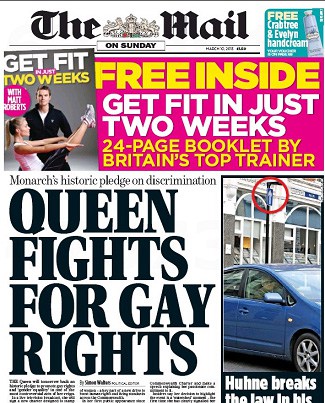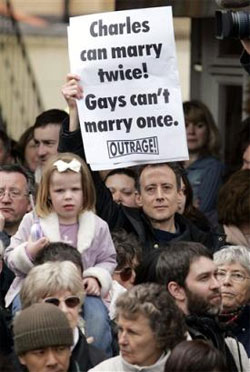The Guardian's Patrick Strudwick puts the kibosh on the Mail on Sunday's weekend headline that started a snowball of proclamations (here, included) that Queen Elizabeth II was coming out for gay rights:
 Fighting for gay rights? The Queen won't even mention them. She dare not speak our name – that is, if you believe she is even referring to gay people; if you buy the newspaper's inference that "other grounds" denotes an "implicit support of gay rights".
Fighting for gay rights? The Queen won't even mention them. She dare not speak our name – that is, if you believe she is even referring to gay people; if you buy the newspaper's inference that "other grounds" denotes an "implicit support of gay rights".
Let us assume it does mean that, and that Stonewall's assumption is correct. How does keeping ma'am about a minority help? Jesus never mentioned homosexuality – has that dissuaded many of his followers that "love thy neighbour" does not in fact mean: "as long as his partner's not called Steve"?
No, to refrain from specification is to collude with silence, the Grand Pause that keeps lesbians and gay men invisible, suffocating in marriages of inconvenience or trapped in police cells…
…The Mail on Sunday's splash is to be applauded, given its apparent heralding of a more liberal stance for the paper, an intriguing contrast to the Daily Mail. But this charter isn't a fight for gay rights, it's a vague whisper muffled by the screams of gay people awaiting the noose.
If only the alleged intention were expressed explicitly, unequivocally. Most Commonwealth nations, injected by our colonial laws and Old Testament homophobia in the first place, need it. Desperately.
Longtime activist Peter Tatchell agrees:
 She's made no such explicit commitment and not used any such words.
She's made no such explicit commitment and not used any such words.
Indeed, in her 61 years on the throne, the Queen has never publicly uttered the words lesbian or gay. She is a patron of hundreds of charities but none of them are gay ones. Not once has she visited or supported a gay charity.
For the last four years, I've been pressing Buckingham Palace over the Queen's failure to acknowledge the existence of lesbian, gay, bisexual and transgender (LGBT) people – and got nowhere.
Not surprisingly, the Commonwealth Charter does not include any specific rejection of discrimination based on sexual orientation or gender identity. This was vetoed by the homophobic majority of member states. They blocked its inclusion.
This makes the Queen's charter signing even less of a big deal. It is certainly not the breakthrough for LGBT rights that some people are claiming.
Nevertheless, it is true that some Commonwealth Secretariat officials interpret the charter wording that rejects discrimination on 'other grounds' as including a rejection of anti-gay discrimination. It is claimed that this catch-all phrase was inserted to circumvent the objections of homophobic Commonwealth countries. Possibly.



